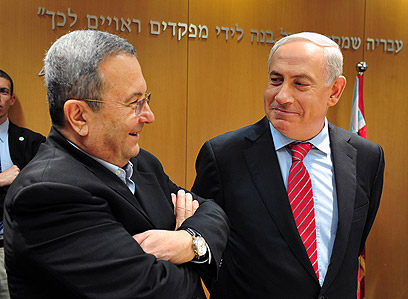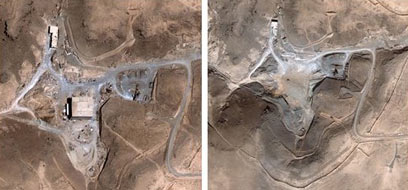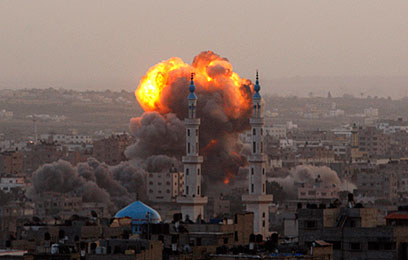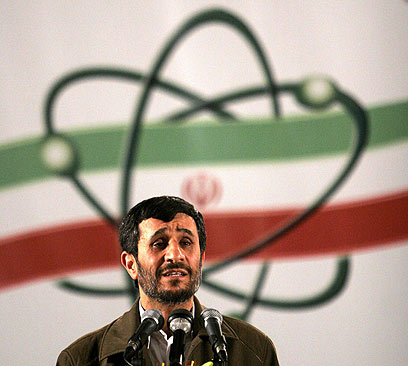
Diskin: Bibi, Barak motivated by personal interests
In second part of interview with director of 'The Gatekeepers,' former Shin Bet chief says Israel's decision-makers are driven by ego. 'There's a crisis of leadership, of values – it's total disregard of the public,' he says
"We're in the middle of a crucial meeting on Iran; in a sensitive forum that includes a group of ministers, security establishment leaders and aides – and there they were: Prime Minister Benjamin Netanyahu, Defense Minister (Ehud) Barak and Foreign Minister (Avigdor) Lieberman, smoking cigars in front of everyone. The defense minister gets up, goes to the bar… and starts pouring himself a drink from one of the bottles. In the midst of this delicate and dramatic discussion, he stands there with his drink and cigar in hand – opposite IDF officers and intelligence personnel. All those present at the panel bore witness to the scene.
"I'm telling you; a picture's worth more than a 1,000 words. Despite the profundity and magnitude of the talks, there was complete disregard for everyone present. I can't even explain what we all felt at that moment. Defense Minister Barak isn't just some guy off the street – a former combat soldier, army officer, Sayeret Matkal chief and IDF chief of staff. He's the one who's supposed to know what setting an example is all about, what the meaning is of being in command. What did he think was going on in the minds of those present? Everyone was looking at each other; texting back and forth.
"I'm not sure if I'm clear enough in painting this surreal picture.
"There was a minister in the room who suffers from respiratory problems. He has sat with them in numerous other panels, and I asked him, 'doesn’t it bother you?' He said 'yes, it actually bothers me a lot,' so I inquire, 'and you don’t say anything about it?' to which he says 'I did; they won't listen.'
"At some point I said I'd stop sitting in on smoke-filled meetings; that I'd walk out if they continued to smoke. Benjamin Netanyahu's Military Secretary Yohanan Locker joined me in this endeavor and we both asserted that in our presence there would be no smoking. Where does this complete disregard for everyone around you come from"?
Ego-driven leadership
Former Shin Bet director Yuval Diskin's tone is unmistakable – a mixture of cynicism, disgust and profound concern. He has been one of the most prominent security establishment chiefs over the past few decades. For 38 years, Diskin has served the security establishment with loyalty and devotion – served and kept silent. Now he feels he can no longer remain silent.
Diskin, Netanyahu and Barak (Photo: Moti Kimhi)
This is his first interview since leaving the Shin Bet. In fact, this is his first interview, but of all the talks we've ever had, I've never heard him as concerned or angry as I did this week.
"I've had the chance to work with the top political echelons since 1994," he said. "I've seen all kinds of leaders – Rabin, Peres, Bibi, Barak, Sharon, Olmert and Bibi again. When I consider this spectrum, I can say that in the moment of truth – Rabin, Peres, Sharon and Olmert – would always prefer State interests over their own.
"They didn't always make the right decision, but you knew where they were coming from – Israel's interests trumped anything else," he said.
"Unfortunately, my feeling, like the feeling of many others in the defense establishment, is that for Netanyahu and Barak – personal, opportunistic interests come first."
Do you have any examples why you get that feeling from Netanyahu and Barak?
"I have a long line of examples, many things that happened in private interactions with these people – in meetings, in private conversations, in decision-making processes, in their willingness to assume responsibilities, or unwillingness, and in the way they conduct themselves and set an example.
"It's a combination of a lot of things that when combined, cause a sense of insecurity and distrust in these people.
"What drove me to address this issue was the fact that the entire time they were talking about the Iranian issue, they were mainly asking whether it was smart or not to strike Iran; whether we possessed operational capability or not. I have an opinion on that too, but I think that the more complex and the more fundamental issue here is whether the country's leadership is even capable of orchestrating a scenario of such proportions.
"It's easy, all you need to do is decide – let's strike Iran. But once we've entered such circumstances, would they – those two, Bibi and Barak – be capable of actually attaining the desired results for the State of Israel? Seeing as I've seen these people in quite a few operations and under various circumstances in the current term and in the past, I and many of my colleagues do not feel secure in their ability to lead such a move. We don’t feel comfortable with their motives.
"Many of us felt that in discussions on sensitive matters during the Olmert and Netanyahu administrations, Barak's impetus for doing certain things, may have been receiving credit. I can't elaborate, but these decisions left people present in the meetings, dumbstruck."
How do these credit-driven decisions make you feel as a person, not a Shin Bet chief?
"As a person, I long for different times, especially for different leaders. Look, I'm not naïve; I guess every leader has his own strengths and weaknesses, but I feel that it's been a while now since we've had leaders who can set an example – which is to me one of the most important leadership qualities – what eventually makes people follow a leader."
"When I look at Netanyahu, I don’t see a leader who can be a role model; and when I look at Ehud Barak I don’t see a leader who can be a role model. I'm not naïve when it comes to Sharon and Olmert or others – everyone makes mistakes and has their own flaws – but still I feel, as do many of my colleagues, that Rabin, Peres, Sharon and Olmert knew how to put national interests ahead of anything else. I didn’t feel that with Netanyahu and Barak."
What do you think drives them?
"I can't provide some in-depth psychological analysis, but I think that it's a lot about ego. I'm pretty certain that when it comes to the Iranian issue, Netanyahu is 'haunted' by Menachem Begin, who struck the reactor in Iraq, and by Olmert, who many claim struck the reactor in Syria. Bibi wants to go down in history as someone who did something on such a scale. I happened to hear him say, on more than one occasion, that his mission – Iran – is on a different scale.
"Fortunately, Bibi is so entrenched in his fears that I'm a little less apprehensive about him working independently – without someone next to him to blame in case something goes wrong. Let's just say he'll have a pretty hard time making substantial decisions without an unwavering chief of staff and defense minister by his side.
In an interview with a foreign journalist, it was suggested that Barak, who replaced Amir Peretz in the Defense Ministry, was against striking the Syrian nuclear plant. This is because he wanted to wait until the Winograd Report ousted Olmert and then he could take credit for the strike as prime minister. Could it be that Barak wanted to risk attacking a reactor that could pollute the Tigris–Euphrates river system just for recognition?
"I can't address that specifically, but I told you that some people under certain circumstances, prefer putting recognition before anything else. And I'll say no more."
Even at the expense of radioactive pollution in a river?
"I told you, I have no intention of addressing that, but there was always a general feeling that at the moment of truth he'd be more driven by personal interest. Was it taken into consideration when planning operations and missions? It most definitely was."
Leadership crisis
Yuval Diskin served the defense establishment for 38 years, the majority of which were spent on counterterrorism efforts. From May 2005 to May 2011, he was involved in decision-making processes on defense and state issues. He is a self-professed patriot and war hawk who believes "there is no room for weakness in our region," but in the face of contemporary politics, he confesses: "After all these years of fighting terror and seeing so much death and killing in battle fields, on Israeli streets, in refugee camps and in villages in the West Bank, the Gaza Strip and Lebanon – there comes a time when you realize you must do everything, everything, to find some other way to talk and compromise so as to secure a better future for our children. And I'm not referring to the political right or left.
What do you think is missing in Netanyahu and Barak?
"They are very fond of saying 'we are the decision-makers,' but de facto, they are nowhere to be found. Look at the Marmara incident – there were many professional errors, specifically in the planning of the raid – you'd expect Sayeret Matkal veterans Netanyahu and Barak, who constantly tell heroic stories about their days in the unit, to know better when hearing of a flawed military plan and either disapprove it or work to fix it."
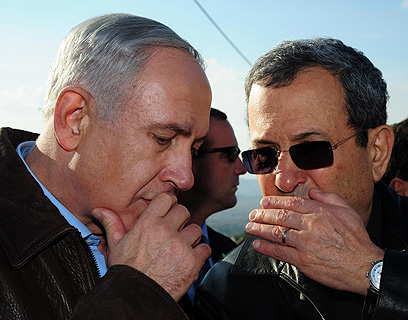
Personal interests? (Photo: Getty Images)
"But they approved that plan. And what was Prime Minister Netanyahu's comment on the state comptroller's report? He said something along the lines of 'The current government is engaged in some serious discussion on security and state issues…' But what about discussing the Marmara case? Were those discussions serious? What about the results? And what was your responsibility as prime minister when it comes to the failures?
"This is a leadership crisis – a total disregard for the public. Some may think that I'm describing the reality in an extreme fashion but I'm telling you that it looks even worse from up-close."
"It could be said that Yuval Diskin has gone mad – but have Diskin, Meir Dagan and many other senior officials still in service all gone mad"?
"My opinion is supported by dozens of conversations with people at my rank… Most people are insecure, distrusting and have no appreciation for those two. What I gathered, and I'm assuming that others did as well, was that we must be more attentive than ever and make sure that all kinds of opportunistic ploys aren’t going on and putting the country in a bind."
You've started your service as a handler, responsible of identifying people's motives and incentives. What is your analysis of Netanyahu?
"Netanyahu has a bunch of things going on simultaneously – ideology and a deep sense of royal or elite entitlement alongside deep fears and insecurities when it comes to making decisions. He doesn’t have a solid enough core on which people can count."
"I've mostly seen him teeter; avoiding to take a stand and driven by some momentary, opportunistic interest. That's why we often felt we should ensure that we don’t find the entire country being driven to great abysses due to impertinent or fraudulent considerations."
March of Folly
"Take Operation Pillar of Defense for example. It's a sort of model for what could happen if we went to war in Iran, before the real thing that Bibi and Barak constantly talked about up until two months ago. So there, we set out on a heroic operation and we ended up applauding what? Iron Dome! Which I wholeheartedly support and I commend all the developers and operators of the system, but it's not the solution to the state we're in.
"And why? Because we don’t have the military capability to stand up and do something to change things in Gaza. Believe me that the State of Israel could have utilized game-changing military moves both in Operation Cast Lead and in Pillar of Defense without occupying all of Gaza. But Bibi and Barak are too weak to lead such moves."
"You can't win wars with big talk and pathos, in which Bibi is undoubtedly the best. And this is just Hamas and a few Gaza Strip organizations. Think of what would happen if we strike in Iran. We could be attacked by Hezbollah, by the Islamic Jihad in the Strip, and of course the Iranians would retaliate. Once that happens, we'd have to face rockets from Lebanon, Iran and the Gaza Strip.
"So now I ask: Do we really believe in the ability of these two, who can hardly run a military operation in the face of Gaza rockets, to get us into this scenario with Iran and also get us out of it? I'm not even getting into the logic of the military move.
"I'm not dovish on security issues, but I think that every country needs to be able to conduct itself with responsibility while being aware of its limits and not out of urges, which I perceive as right down messianic.
"I'll tell you something else, even if it's not so popular. Even if, God forbid, the Iranians have a bomb – which is not at all something I want – it's still not the worst case scenario for Israel. It's awful and we must do everything we can to prevent it, but I don’t see it as the worst. There are worse things that can happen. To me, inner national conflicts are much worse than an Iranian bomb. That's the way I see it."
Are you sure that Netanyahu and Barak are heading to war with Iran?
"Some say this is a genius move concocted by these two guys from Sayeret Matkal trying to pressure the world into striking Iran. I can't of course rule out the possibility that there's some sort of trick here, but I'm one of those who still believe that a gun in the first act will be fired in the third act. Barbara Tuchman's "The March of Folly" is full of examples for the most irrational decisions made out of irrelevant considerations and dragging the whole world to the greatest crises or the most dramatic wars."
What about descriptions of Netanyahu and Barak preparing military leadership for war?
"I never wanted to get into that, but since things got out, I'll tell you that there was a meeting in which they tried to convince us to prepare the military and security systems into launching an operation, when clearly such an operation would mean going to war. Then the three of us spoke strongly against the instructions and had a very harsh argument with Bibi and Barak."
Who are 'the three of us'?
"Mossad chief, Shin Bet director and the IDF chief of staff. I think the Military Intelligence chief was there. We got up and said that it was an illegal decision, that they couldn’t give us such instructions because it meant that you're preparing the army for war. And going to war is a decision that only the government can make.
"If you tell the army to be prepared for action within a certain amount of time, these are not preparations that should be made in conference rooms. The army has all kinds of actions to perform – draft reserve units, preparing equipment and starting drills. It's very hard to keep these things secret for long. When you work with such a vast system, you're facing dire consequences. It's not like I pick up a phone to a few guys and say 'get ready,' this is taking an entire country down a path that is very likely to lead to war. That is not a decision that could be made independently by the defense minister or the prime minister.
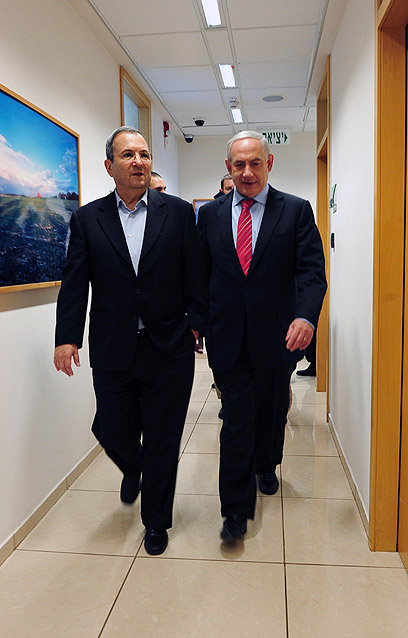
'Too weak to lead' (Photo: Ariel Hermony, Defense Ministry)
"So we had a very heated debate, which got worse when ministers started sensing that this move was contrived behind their backs. Why weren't they consulted? The whole thing reeked and after we protested, many ministers started protesting.
And what happened in the end?
"Again, one might say it was a manipulation of the international community. Maybe, but I never saw anyone from the international community sitting in the room at that closed discussion so I can't explain it.
"And that's one of the reasons that I fear that there are stages where people's egos and all sorts of messianic notions can drag us to places we never meant to get to. They may have not even meant to get there but suddenly you find a whole country sucked into this story. And what you can't argue with is the fact this move was canceled. So I guess something was wrong with it."
What can we learn from this event?
"I don’t remember in all the years I've been involved in decision making processes such a prominent lack of trust by security officials in the leaders. And that's something people must take notice of these days. All Israeli citizens have a good reason to be concerned.
"The public must take into account that people such as Meir Dagan and Yuval Diskin – both not known as "doves" on the security level, and people like Gabi Ashkenazi, Uri Sagi, Amnon Lipkin-Shahak – first rate security officials – are all voicing concern about this move. Suddenly we're all cowards? No, it comes from a profound lack of trust in these two people and the moves they lead."
Deadly stalemate
While on the Iranian issue, Diskin was dragged into the "line of fire" through his colleagues' efforts to restrain Netanyahu and Barak, on the Palestinian issue his frustration was of a different nature. Here his main concern was the idleness and intentional stalemate which now threaten to ignite a third intifada.
"Notice the following fact: The Netanyahu government from the day it was formed drew its strength from stalemate. As long as there is deadlock in almost any area, the government and coalition will survive - and that's Netanyahu's primary goal.
"But beyond that, Netanyahu has ideological concerns with pursuing a two-state solution and more than that – he does not have the personal capacity to make decisions of the scale Begin, Rabin or Sharon made.
"What is most serious in my eyes is the fact that he is surrounded by people who drag the Likud further to the right. The Americans too, sadly, do not exert their influence in the region to make the parties move forward and that is how we are where we are."
"But things don't stop here. In the past few months we have seen growing unrest among Palestinians in Judea and Samaria. And when things become heated on the ground we will be forced to act in order to suppress the unrest. Forceful moves will beget forceful reactions and that's how an intifada gets beyond control. "
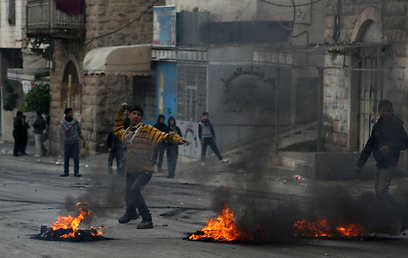
Riots in Hebron (Photo: AFP)
Netanyahu stated that he is committed to the two-state solution in his Bar Ilan speech. Did you discuss this at all when you were Shin Bet chief?
"It came up in many discussions, but I never had the feeling that Bibi truly means to go through with it. It was empty words. There was a lot of nit-picking by him over the technical details of who will talk to whom, who will not talk to whom, which communication channels will be opened and which closed, but in actual fact there was very little to it. Until the end of my term, at least, I didn't feel that there was true meaning behind it.
"There might have been one stage when I thought Bibi was waking up. He asked me, after a meeting in which I showed him the need to initiate a diplomatic process with the Palestinians, to come to the forum of eight top ministers and present my views on the matter.
"I came and talked and there were a lot of questions and arguments, but during the debate I could see Bibi folding and withdrawing into himself, and obviously not backing the things we discussed between us earlier, just sitting there silently. Finally it ended with the usual Bibi conclusion – we will have further discussions on the matter. I'll let you guess what happened in the next discussion."
And what is happening today?
"We are making Mahmoud Abbas weaker every day and consider it a success. I think we should make up our minds with whom do we want to negotiate - Hamas or Abbas. If it's with Abbas, then let's talk to him. But what is actually being done is that no one talks to Abbas, mostly we just humiliate him.
"The height of absurdity: Through the years, one of the main people responsible for Hamas' rise is Bibi Netanyahu, ever since his first term as prime minister. After the Amman fiasco he released Sheikh Ahmed Yassin (the failed Mossad attempt to assassinate Khaled Mashaal after which King Hussein demanded the release of Sheikh Yassin in return for the release of Mossad operatives captured in Jordan – D.M.)
"After that he released all the prisoners in the Shalit deal, which is another push for Hamas, and finally allowed Khaled Mashaal's triumphant return to the Gaza strip following Operation Pillar of Defense."
Everyone's a hero before elections
What should and can be done?
"For a start, we should attempt to achieve many small successes which will create a positive atmosphere, instead of risking a big failure. In my experience that is better. After that we should start discussing the core issues.
"We have no real territorial dispute with Gaza. The complex territorial issue is in Judea and Samaria, where we have a much better partner than Hamas. Therefore I think we should attempt to achieve security calm in the Gaza strip for as long as possible, and meanwhile try and solve the complex West Bank issue. First we must diffuse the situation, ease the pressure, but do it gradually, in stages.
"This process cannot happen parallel to continued construction in the settlements. We need to reach a stage in which we keep roughly the major settlement blocs, which everyone knows will probably stay under Israeli control, even if it will cost us some territorial exchanges.
"Inside these blocs construction will continue if necessary, but all other construction should be frozen and all illegal outposts removed. On this basis we can start creating an atmosphere which will allow the renewal of the diplomatic process and negotiations with Abbas."
What about construction in east Jerusalem or area E1?
"Is E1 Jerusalem? It is an interesting question. I think most governments, including Sharon's pledge not to build in E1. Obviously it was an eve of elections decision. I'm not sure they will keep to it, but failed commitments cause severe damage to Israel's image and in the end will lead to heavy international pressure."
Netanyahu says he doesn't care about the Europeans.
"Everyone's a hero before the elections. I'm not impressed with these statements. Bibi, from my acquaintance with him, is far more susceptible to pressure than he seems. I suppose that finally, if the Americans want it badly enough, the president will use his leverage and Bibi will fold."
Dror Moreh is the director of the documentary "The Gatekeepers"
- Receive Ynetnews updates directly to your desktop











